Are Calathea Plants Toxic to Cats and Dogs? Safety Tips for Pet Owners
Calathea plants are a popular choice among plant enthusiasts for their beautiful foliage and air-purifying qualities. However, pet owners should be aware that certain varieties of Calathea can be toxic to cats and dogs if ingested. It’s important to take precautions to ensure the safety of your furry friends.
If you have a Calathea plant or are considering getting one, here are some safety tips for pet owners:
Key Takeaways:
- Calathea plants can be toxic to cats and dogs if ingested.
- Keep Calathea plants out of reach of pets to prevent accidental ingestion.
- Watch out for symptoms of poisoning, such as vomiting, diarrhea, and lethargy.
- If you suspect your pet has ingested a toxic plant, contact your veterinarian immediately.
- Consider choosing pet-friendly houseplants that are non-toxic to cats and dogs.
Pet-Friendly Houseplants: Non-Toxic Options for Cat and Dog Owners
If you’re a pet owner looking to add some greenery to your home, there are plenty of pet-friendly houseplants that you can choose from. These plants are safe for cats and dogs and can add a touch of nature to your indoor space. As a responsible pet owner, it’s important to select plants that won’t harm your beloved pets if they decide to take a nibble. Here are a few pet-friendly houseplants that are non-toxic to cats and dogs:
| Plant Name | Scientific Name | Benefits |
|---|---|---|
| Spider Plant | Chlorophytum comosum | Improves air quality, easy to care for |
| Areca Palm | Dypsis lutescens | Filters indoor air pollutants, adds a tropical touch |
| Boston Fern | Nephrolepis exaltata | Humidifies the air, visually appealing |
| Calathea Orbifolia | Calathea orbifolia | Stunning foliage, low maintenance |
These are just a few examples of pet-friendly houseplants that can thrive in your home environment without posing a risk to your furry friends. However, it’s important to note that even non-toxic plants can still cause an upset stomach or digestive issues if ingested in large quantities. It’s always a good idea to monitor your pets around plants and discourage any chewing or nibbling.
Remember to place your pet-friendly houseplants in safe and secure locations, out of reach of curious paws. You can also consider using hanging planters or plant stands to keep your green friends elevated and inaccessible to your pets. Additionally, be mindful of any fertilizers or pesticides you may use on your plants, as these can be harmful to pets if ingested.
By incorporating pet-friendly houseplants into your home decor, you can create a beautiful and safe environment for both your plants and your beloved pets. The added greenery will not only enhance the aesthetics of your space but also provide a calming and soothing atmosphere. Enjoy the benefits of indoor plants while keeping your furry friends safe!
Tips for Creating a Pet-Safe Home with Plants
As a pet owner, creating a pet-safe home with plants goes beyond simply choosing non-toxic options. While selecting plants that won’t harm your furry friends is essential, there are additional measures you can take to ensure their safety.
First, be mindful of plant placement. Keep your plants out of reach of your pets by placing them on high shelves or using hanging baskets. This will prevent curious paws from getting into trouble. Additionally, be cautious with trailing plants as they can entice pets to play and potentially knock over pots.
Next, it’s crucial to research each plant’s care requirements. Some plants may require fertilizers, pesticides, or other chemicals that can be harmful to pets. Always choose natural alternatives and make sure to keep any potentially hazardous substances securely stored away from your pets’ reach.
Lastly, regularly inspect your plants for any signs of damage or wilting. Some plants have leaves or flowers that can cause irritation or allergic reactions if ingested. If you notice any signs of chewing or nibbling, it’s best to remove the plant from your pet’s reach or replace it with a safer alternative.
FAQ
Are calathea plants safe for cats and dogs?
Yes, calathea plants are non-toxic to cats and dogs. They are considered pet-friendly plants.
What other houseplants are safe for pets?
In addition to calatheas, other pet-friendly plants include the spider plant, areca palm, and Boston fern. These plants are non-toxic to cats and dogs.
What precautions should pet owners take with indoor plants?
Pet owners should ensure that their indoor plants are non-toxic to their pets. Some plants can be poisonous if ingested. It’s also a good idea to provide pet-friendly plants like cat grass for pets that like to nibble on foliage.
How can I tell if a plant is toxic to my pet?
If a plant is toxic, it may cause symptoms like vomiting, diarrhea, or drooling in your pet. If you’re unsure about a plant’s toxicity, it’s best to consult with a vet or a local nursery.
What should I do if my pet ingests a poisonous plant?
If your pet ingests a poisonous plant, contact your vet immediately. They can provide guidance based on the type of plant and the amount ingested.
Are there any types of calathea that are particularly good for homes with pets?
All types of calathea are considered pet-safe, including popular varieties like the calathea orbifolia and the polka dot plant. These plants are non-toxic to both dogs and cats.
Can pets damage indoor plants?
Yes, pets can sometimes damage indoor plants by chewing on leaves or knocking over pots. To prevent this, consider placing plants out of reach or providing pet-friendly plants for your pets to interact with.
How can I keep my indoor garden safe for pets?
To keep your indoor garden safe for pets, choose plants that are non-toxic to your specific pet. Also, ensure that plants are securely placed so they can’t be knocked over. Regularly check plants for any signs of pest infestations which could also harm your pets.
What are some pet-friendly alternatives to calathea plants?
If you’re looking for pet-friendly alternatives to calathea plants, consider the areca palm, Boston fern, or spider plant. These plants are all non-toxic to cats and dogs.
Are prayer plants safe for pets?
Yes, prayer plants are safe for pets. They are non-toxic to both cats and dogs and are a great addition to any pet-friendly indoor garden.







